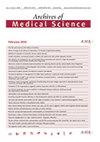炎症细胞因子与前列腺癌之间的关系
IF 3
4区 医学
Q1 MEDICINE, GENERAL & INTERNAL
引用次数: 0
摘要
我们进行了双向双样本孟德尔随机化(MR)分析,以研究91种炎症细胞因子与前列腺癌(PCa)之间的因果关系。反方差加权(IVW)模型是主要的双样本MR分析方法,用于估计暴露对结果的因果效应。此外,还采用了加权中值法(WM)和MR Egger法来补充IVW模型。对 IVW 和 MR Egger 方法均使用 Cochran's Q 检验进行了敏感性分析。经 Bonferroni 校正后,IVW 分析显示 PCa 与 C-C motif 趋化因子 20(CCL20)、C-C motif 趋化因子 23(CCL23)、成纤维细胞生长因子 19(FGF19)、成纤维细胞生长因子 23(FGF23)和白细胞介素 6(IL-6)的水平呈正相关。值得注意的是,IL-6 显示出最强的正相关效应(几率比[95% 置信区间]:1.0076 [1.0014, 1.0139]),其次是 CCL-20 (1.0067 [1.0004, 1.0129])和 FGF23 ([1.0002, 1.0119])。本研究认为,CCL20、CCL23、FGF19、FGF23 和 IL-6 的水平与 PCa 的发生存在正相关。此外,我们还发现有证据支持 IL22RA1 水平下降与 PCa 发生之间的因果关系。这些发现揭示了新的生物标志物和通路,有可能成为预防和临床治疗 PCa 的靶点。本文章由计算机程序翻译,如有差异,请以英文原文为准。
Association between inflammatory cytokines and prostate cancer
We conducted bidirectional two-sample Mendelian Randomization (MR) analysis to investigate the causal relationship between 91 inflammatory cytokines and prostate cancer (PCa).The Inverse Variance Weighted (IVW) model served as the primary two-sample MR analysis method, utilized to estimate the causal effect of exposure on the outcome. The Weighted Median (WM) and MR Egger methods were additionally employed to complement the IVW model. Sensitivity analyses were performed using Cochran's Q test for both the IVW and MR Egger methods. To assess the presence of horizontal pleiotropy, the instrumental variables (IVs) were subjected to the MR-Egger intercept test.Following Bonferroni correction, the IVW analysis revealed positive correlations between PCa and the levels of C-C motif chemokine 20 (CCL20), C-C motif chemokine 23 (CCL23), fibroblast growth factor 19 (FGF19), fibroblast growth factor 23 (FGF23), and interleukin-6 (IL-6). Notably, IL-6 exhibited the strongest positive association effect (odds ratio [95% confidence interval]: 1.0076 [1.0014, 1.0139]), followed by CCL-20 (1.0067 [1.0004, 1.0129]) and FGF23 ([1.0002, 1.0119]). Reverse MR analysis indicated a negative causal relationship between PCa and interleukin-22 receptor subunit alpha-1 levels (IL22RA1) (0.4852 [0.2390, 0.9847]).This study proposes that there exists a positive correlation between the levels of CCL20, CCL23, FGF19, FGF23, and IL-6 and the occurrence of PCa. Furthermore, we found evidence to support the causal relationship between decreased levels of IL22RA1 and the development of PCa. These findings unveil novel biomarkers and pathways that could potentially be targeted for the prevention and clinical treatment of PCa.
求助全文
通过发布文献求助,成功后即可免费获取论文全文。
去求助
来源期刊

Archives of Medical Science
医学-医学:内科
CiteScore
4.90
自引率
7.90%
发文量
139
审稿时长
1.7 months
期刊介绍:
Archives of Medical Science (AMS) publishes high quality original articles and reviews of recognized scientists that deal with all scientific medicine. AMS opens the possibilities for young, capable scientists. The journal would like to give them a chance to have a publication following matter-of-fact, professional review by outstanding, famous medical scientists. Thanks to that they will have an opportunity to present their study results and/or receive useful advice about the mistakes they have made so far.
The second equally important aim is a presentation of review manuscripts of recognized scientists about the educational capacity, in order that young scientists, often at the beginning of their scientific carrier, could constantly deepen their medical knowledge and be up-to-date with current guidelines and trends in world-wide medicine. The fact that our educational articles are written by world-famous scientists determines their innovation and the highest quality.
 求助内容:
求助内容: 应助结果提醒方式:
应助结果提醒方式:


